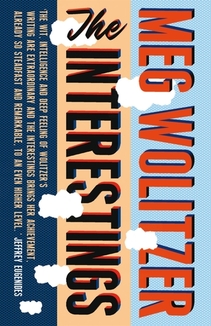
Fifteen-year-old Jules is taken in by the cool kids at the arty Spirit-in-the-Woods summer camp, or perhaps, this being the early 70s they’d be the trendy set. (Don’t ask me, I only lived through that period.) Whatever (which they definitely didn’t say back then, or certainly not in a flippant way), they are so in love with irony they adopt the name “the interestings”, not registering that even their irony can be ironic. The camp is idyllic, indulging the teenagers to believe in their talent. Jules, from a small town with small-town ambitions, still grieving her father’s death less than a year before, leaves convinced she can make it as an actor (or would it have been an actress back then?).
I’m afraid Jules’ sense of failure at being only a therapist caused some amusement at my small book group of current and former therapists. We were also somewhat surprised that she never once considers psychotherapy as an option for her husband, who suffers with depression for years. Yet, in many ways, Dennis holds the position of sanity within the group; unlike Jules, he’s never seduced or intimidated by the wealth of their friends and, instead of chasing after the fluff of celebrity, he emerges from his cocoon of depression to find satisfaction and contentment in the ordinary life of work and family.
This is a long novel (468 pages of small type) with lots of different threads which often left me stumped as to what it was supposed to be about. In a way it seems to be a story of protracted adolescence, of “hearts always … aching” (p131), that’s resolved, for a lucky few, in middle age. None of the characters (except perhaps Dennis, although he suffers terribly for it) seems to get what they originally wanted; even Ethan is pulled away from his essential creativity by the success of his enterprise. And his wealth brings unwelcome responsibilities, including for the workers of the Third World factories producing the Figman merchandise. There’s also a moral theme in what happens to Cathy, in the Wolf family’s sense of entitlement and the protection of Goodman, the unruly son, and in the morality of secrets and divided loyalties, which feels to Jules (p232):
like a sort of pressure between the eyes, a legal, moral migraine, [yet] she often still felt stupidly special to have been included.
For Jules particularly, morality seems rooted in adolescent preoccupations: even as a middle-aged woman, she still idealises Spirit-in-the-Woods, and the person it made her, full of envy for the friends who seem to have more than she has. Perhaps the novel is asking how much self-belief is good for us, and when and how does the narcissism of youth go away?
It’s a bit of a risk to put the word “interesting” in the title of a novel, even in an ironic way. While there are many “interestings” in this novel, I found it hard, with such a broad sweep of characters and time, to hold it all together and, at times, I didn’t feel interested in it at all. Nevertheless, it’s flagged as the New York Times bestseller and my paperback copy (courtesy of Vintage books) quotes many glowing reviews. But for me, and for my book group friends, a book of this at length needs something more.





















 RSS Feed
RSS Feed





















